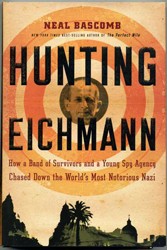This new volume, the first on its topic in over 40 years, describes in excruciating detail, using recently discovered documents, how Eichmann became Eichmann. How did a low-level Nazi bureaucrat become Hitler’s “expert” on the Jews and become ultimately responsible for the deaths of over two million Jews in various concentration camps? On this simplest level, a biography of a World War II SS officer, the book works well.
However, it is the deeper layers of this book that are the most thought-provoking. In addition to a description of Eichmann’s life and its historical context, there is an he became a mass murderer. His early military career did not portend its final outcome. Initially, he had a working relationship with Zionist Jews which took a horrible turn somewhere along the line. He eventually applied a cold, matter-of-fact method to the mass murder of humans, much the same as a middle-level manager might manage widgets. This next layer tries to further decipher Eichmann, as he was neither hardwired or necessarily pre-disposed to become a genocidal maniac.
The deeper layer, then, forces the reader to put him- or herself in the subject’s shoes, and asks a chilling question: What would happen to me in a similar position? The book works well on all levels. And like an onion, the deepest layers are not always the most appetizing.




